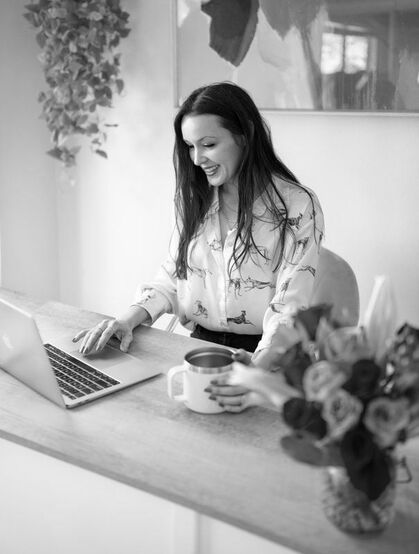|
When we say we are not good at something, we close the door to trying and learning. Usually when we say things like that, we don’t think too much about it. We consider these narratives to be facts. It seems that we are simply sharing the truth of who we are (It is a fact I’m not good at it.)
But is it really a fact? It’s not. It’s the way we perceive and choose to define ourselves. I say choose on purpose because I believe we have the agency to decide how we define ourselves. So why define yourself in ways that limit attempts to improve and learn? You, of course, get to decide to keep believing you are not good at something. But if you do, make sure that belief is not sabotaging your attempts to become better. Instead, I suggest saying: “I’m willing to try.” Having the willingness to try is related to openness and possibility. When we’re willing to try, we are giving ourselves a chance, we are keeping our options open, and we are not limiting our identity. Most of the time, we won’t be good at something right away, at that is not even the point. The point is to be willing to try and see where it takes us. The after we try, we might decide to never do it again. But if we stick with it and keep trying, we may learn new things about ourselves. It may give us a new perspective on what we’re capable of and what’s possible when we don’t immediately give up. Accomplishing one thing is moving you forward more than wanting it all but doing nothing.
All or Nothing thinking is one of the biggest mindset traps and obstacles to growth and progress. All or nothing thinking is a cop-out from trying. It is lazy thinking. It lacks flexibility and nuance. It pretends to be useful (“I want to do it the right way”) but it’s leading to self-sabotage and stagnation. It may sound like… “I don’t have time to workout an hour a day, so I’m not going to work out at all” “If I can’t succeed the first time, I never will” “I messed up one time, so what’s the point of continuing” “One bad thing happened, now my whole day is ruined” “I don’t have time to do it “the right way” so I’m going to wait.” Or any variation of giving yourself only two options. Remember that completed is always better than perfect. All of nothing thinking loses its power when we decide to focus on doing what we can do (no matter how small the step seems) instead of thinking about doing big things, but never acting on them because we’re waiting for perfect conditions. Forget about doing it all, just do something.  Are you committed to creating on purpose or re-creating by default? We are always committed to something, whether it is a conscious choice or a mindless reaction. Consciously committing to a particular goal means that we are deciding how to spend our time and what to focus on. It means that we are the agents of change in our lives and feel empowered to creating desired experiences in our lives. Commitment by default means that we are committed to creating more of the same. By not choosing where to focus our energy, we spend our time mindlessly reacting to anything that comes our way and thus continuously recreating the same unwanted experiences. Knowing what you’re committed to is important because what you spend your time on is either helping you grow and advance or it’s keeping you stuck. What you’re committed to, you will keep finding evidence for and you will keep being better at. So the question is: Do you want to be better at creating experiences on purpose or do you want to be better at re-creating more of the same? If you are not sure what you are committed to, observe what you do daily and how you spend your time. Check in with yourself:
 ABW: Tell us a little bit about yourself and how Inner Becoming was born My name is Sladja Redner, and I am a psychotherapist and a personal growth coach. Growing up I always felt like an old soul and was deeply moved and inspired by stories of people who overcame adversities and not just found themselves on the other side but were able to completely transform and achieve extraordinary things. This is something I wanted for myself as well. Partly running away from a life that felt unfulfilling and partly being pulled towards greater life experiences, I started working on cruise ships. This was the first time I left my home country of Serbia. This opportunity opened new possibilities for me and guided me to where I am now. Through my own experiences and change, I came to realize we are not doomed to be victims of our circumstances. It is never too late to begin living the life we desire because we all have a choice to connect to our purpose, live authentically, and contribute with our unique gifts. My interest in human possibilities, healing, and change is what lead me to pursue a master’s degree in counseling and becoming a therapist. Inner Becoming was born out of my belief in transformation, my enthusiasm for personal growth, and a desire to own my business. ABW: What does this business mean to you? Inner Becoming is both a reminder to always trust myself and follow my own knowing as well as a proof that a girl like me, who never thought she would own her own business, can absolutely do it. Ever since I intentionally started working towards becoming a psychotherapist, I knew I wanted to own a private practice, but when I finished my internship, I was faced with a decision of whether to work in an agency or follow my knowing and desire. Well meaning, more seasoned mentors had discouraged me from going into a private practice, urging that “I should pay my dues,” and work in an agency. But I decided to follow my intuition and not settle or succumb to expectations of others. ABW: What types of services do you provide? I provide individual psychotherapy and life coaching, both of which serve different needs at various points in one’s life. My psychotherapy specialty is in helping people heal from developmental trauma. I work with individuals who struggle to move on from the past and long to heal difficult childhood experiences and childhood emotional neglect. Various ways in which these unhealed wounds show up in adulthood are emotional overwhelm, struggles to maintain relationships, self-doubt, shame, guilt, self-sabotaging behaviors and thoughts, and an overall sense that the world is not a safe place. Psychotherapy is often a long term and a non-linear process of creating safety and understanding of how behaviors that were once helpful now create constriction and limitation in the present. As a coach, I work with those who are eager to create specific changes in their lives. Coaching tends to be more of a short-term process that is present, and future oriented. I love helping both new and first-generation professionals overcome limiting beliefs and trust themselves. Additionally, I support those wanting to create healthy habits and lifestyle changes that will support their wellbeing long term. ABW: How can someone determine what is best for them? Therapy and coaching can overlap, but there are a few things to consider when deciding which service will best address one’s current needs. If someone is deep in their struggles and unable to untangle themselves from pain, regret, shame, overwhelm, people pleasing behaviors, and suffering, therapy is the best choice. Therapy supports greater awareness of behaviors and thought patterns that keep us overwhelmed, helps us heal from past wounds, supports a regained sense of autonomy, deepens our self-knowledge and understanding, and facilitates regulation of our emotions. Coaching is well suited for working on a particular area in one’s life to change something in the present or to create a specific result in the future. My style of coaching is causal coaching and includes identifying the cause of people’s unwanted results and shifting their beliefs to align with their true intentions and values. ABW: You have an exciting workshop coming up, can you tell us a bit more about the workshop and what people can anticipate? Yes! I’m so excited for this workshop. It will focus on the beliefs we have about ourselves and why beliefs are important. I will share practical tools for recognizing a belief that doesn’t serve us and how to shift it into a belief that does. This is a topic that is close to my heart, and I’m looking forward to sharing my knowledge with everyone who decides to attend. I hope participants will leave with tools they can immediately implement for their own personal and professional growth. ABW: What has been the most meaningful part of your work? My work never feels like just a job because it is purposeful and enriching. The most meaningful part of my work is the opportunity to witness so many different stories of humanity, resilience, struggle, healing, and growth. I strive to provide a space for people to meet themselves in a deeper, more compassionate way, and challenge the stories that once served a great purpose, but no longer do. ABW: What are the most challenging parts of your work? For this kind of work, it is not enough to just show up mindlessly. It takes presence, focus, and curiosity for each individual client, in addition to the behind-the-scenes of running a smooth business. At times it feels like there are not enough days in the week to do all the things I’d like to do! ABW: Outside of work and the business of owning a business, what do you enjoy doing? Spending time outdoors is my happy place. I love taking a walk with my dog on the neighborhood trail and going to Zilker park to read, journal, and people watch. Wining and dining in any of the great restaurants or hosting a dinner party are other fun things I enjoy. My husband is a professional musician so I whenever I have a chance I love to go out and watch him perform around Austin. It is our responsibility to believe in ourselves.
Sometimes others see a potential in us that we struggle to see. We may see ourselves through the filters of our failures, judgments, and mistakes, but others may see our strength, resilience, and determination. Being surrounded by people we trust and who support our success is crucial, but being our own guide and finding our own voice is what builds courage. Connecting to the trust within ourselves is what will support us though anything. Interpretation of past experiences conditioning |
Categories
All
Archives
June 2024
AuthorSladja Redner |
 RSS Feed
RSS Feed